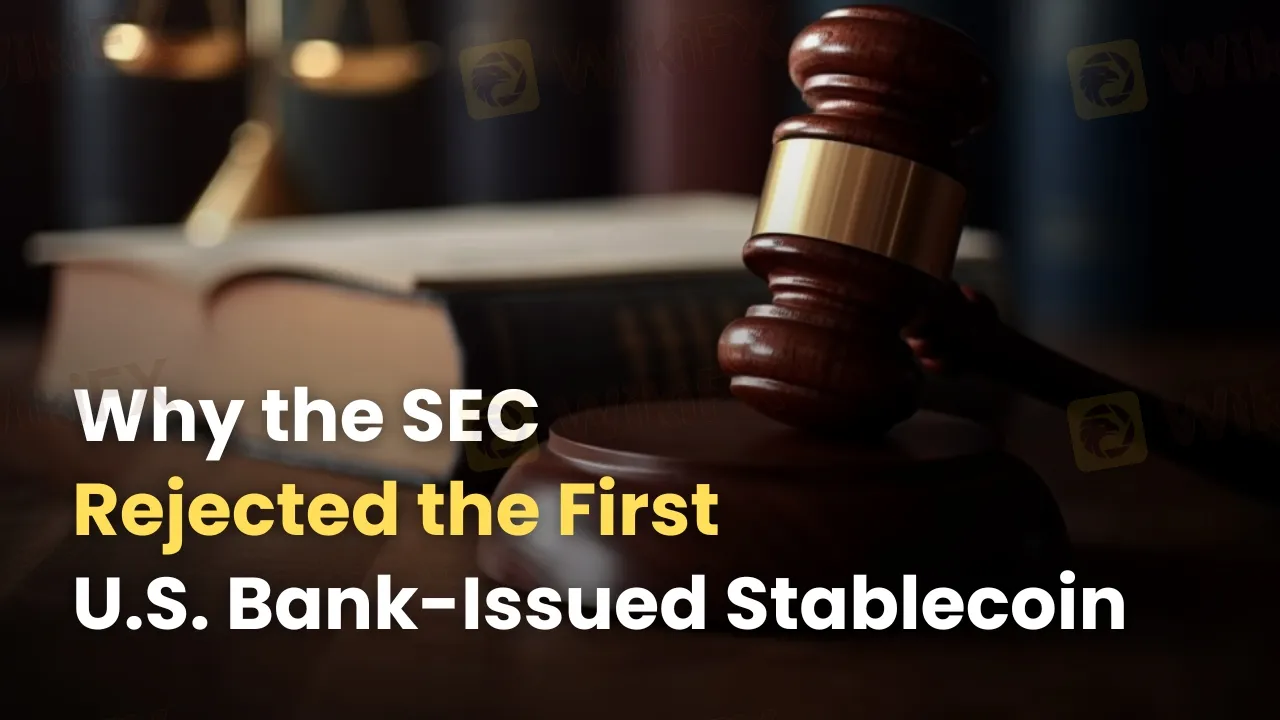简体中文
繁體中文
English
Pусский
日本語
ภาษาไทย
Tiếng Việt
Bahasa Indonesia
Español
हिन्दी
Filippiiniläinen
Français
Deutsch
Português
Türkçe
한국어
العربية
Why the SEC Rejected the First U.S. Bank-Issued Stablecoin
Abstract:The SEC rejected the first U.S. bank-issued stablecoin, citing regulatory concerns. This decision highlights the ongoing challenges in crypto asset classification and oversight.

Acting SEC Chair Uyeda is asking for a big change in how the agency deals with cryptocurrency. He spoke at a Crypto Task Force meeting on March 21 in Washington D.C., saying the SEC should make clear rules instead of just punishing people to help the industry understand whats allowed. This comes as a U.S. bank starts a new stablecoin on Ethereum, a blockchain anyone can use, which is a big step for digital money.
At the same time, Bitcoin‘s price isn’t moving much, making people wonder if its usual four-year pattern still matters. Plus, a new survey says 76% of U.S. investors want to buy more crypto ETFs. And the Senate just voted strongly to stop an IRS rule that would hurt DeFi developers. Now, that decision waits for President Trump to sign it.
Uyeda made his point loud and clear at the meeting, where regulators, lawyers, and crypto folks gathered. He wants the SEC to use a process where they ask for opinions and explain their thinking, not just jump to enforcement. “This approach of using notice-and-comment rulemaking or explaining the Commission‘s thought process through releases – rather than through enforcement actions – should have been considered for classifying crypto assets under the federal securities laws,” he said. He’s tired of the confusing rules that have messed up crypto for a long time.

He talked about the Howey test, a 1946 court decision that decides what counts as an investment. Courts dont agree on how to use it for crypto, which makes things tricky. Uyeda remembered when he worked in California and said a certificate of deposit with a bonus was an investment, but the court said no. Now, he sees courts split again—some say you need pooled money and shared profits, while others look at risks or when the work happens.
“Differences in opinions among various courts are not unusual,” Uyeda said. “After all, a judicial opinion is limited to the particular facts and circumstances of that case.” He pointed out that when courts cant agree, the SEC has helped before—like with whisky receipts and condo sales. He thinks crypto needs that help too.
Uyeda‘s timing matches some big news. The stablecoin on Ethereum shows more people are using crypto. The Senate’s vote supports DeFi, but Bitcoin‘s flat price has experts scratching their heads. With all this happening, Uyeda’s idea to focus on rules instead of enforcement could change how the SEC handles crypto.
Investors seem excited about crypto ETFs, according to the survey, even with all the confusion. They trust these products. Uyeda‘s push for clear rules has everyone watching. Will the SEC switch to making rules, or keep enforcing them? With Trump’s signature still needed for the DeFi bill, things could shift big time soon.

Disclaimer:
The views in this article only represent the author's personal views, and do not constitute investment advice on this platform. This platform does not guarantee the accuracy, completeness and timeliness of the information in the article, and will not be liable for any loss caused by the use of or reliance on the information in the article.
Read more

Georgia Man Charged in Danbury Kidnapping and Crypto Extortion Plot
Georgia man James Schwab charged in Danbury kidnapping tied to $230M crypto heist. Plot targeted couple for ransom after Miami altercation with son.

Bybit Shuts Down NFT Marketplace Amid Crypto Market Downturn
Bybit announces the closure of its NFT marketplace, citing efforts to streamline offerings. Discover the latest trends in the declining NFT market and its shift to utility-based growth.

Galaxy Digital Settles $200M in Luna Token Manipulation Case
Galaxy Digital pays $200M to settle Luna token manipulation probe by NY regulators, linked to TerraUSD’s 2022 crash, impacting crypto market stability.

April Forex Trends: EUR/USD, GBP/USD, USD/JPY, AUD/USD, USD/CAD Insights
Know April’s forex seasonality trends for EUR/USD, GBP/USD, USD/JPY, AUD/USD, and USD/CAD. Historical insights and key levels to watch in 2025.
WikiFX Broker
Latest News
Exposing the Top 5 Scam Brokers of March 2025: A Closer Look by WikiFX
Gold Prices Climb Again – Have Investors Seized the Opportunity?
Webull Launches SMSF Investment Platform with Zero Fees
Australian Regulator Warns of Money Laundering and Fraud Risks in Crypto ATMs
The Withdrawal Trap: How Scam Brokers Lure Victims into Paying More
FCA to Investors: Think Twice Before Trusting These Brokers
Trump\s tariffs: How could they affect the UK and your money
Trump gambles it all on global tariffs he\s wanted for decades
TradingView Brings Live Market Charts to Telegram Users with New Mini App
HTFX Spreads Joy During Eid Charity Event in Jakarta
Currency Calculator







